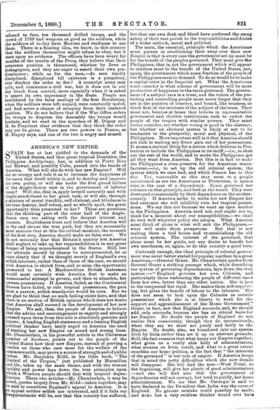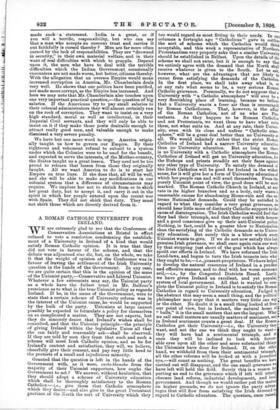AMERICA'S NEW EMPIRE.
SPAIN has at last yielded to the demands of the United States, and that great tropical Dominion, the Philippine Archipelago, has, in addition to Porto Rico and Hawaii, and possibly Cuba, passed into the hands of America. What will she do with her new Empire ? Will she so occupy and rule it as to increase the happiness of the races that dwell within it, and to develop and improve her own polity, or will she make the first grand failure of the Anglo-Saxon race in the government of inferior races ? Will she, that is, apply herself earnestly and with single-mindedness to her great task, or will she, through a mixture of moral timidity, self-distrust, and blindness to her true destiny, half refuse, and so wholly spoil, the great opportunity thus presented to her ? These are questions that the thinking part of the other half of the Anglo- Saxon race are asking with the deepest interest and concern. Englishmen trust and believe that America will in the end choose the true path, but they are necessarily most anxious that at this the critical moment, the moment of the first step, America should make no false start. We do not seriously fear that Britain's anxiety lest America shall neglect to take up her responsibilities is in any great danger of being misunderstood in the States. Still, lest our attitude should by chance be misrepresented, let us state clearly that if we thought merely of England's own selfish interests, rather than of those of the race, we should wish America to shrink from, and so miss, the opportunity presented to her. A Machiavellian British statesman would moat certainly wish America first to make an unsuccessful attempt to govern, and then to abandon, her oversee. possessions. If America failed, as the Continental Powers have failed, to rule tropical possessions, the gain from a narrow, selfish standpoint would be ours. But we are glad to think that no such feeling exists here, and that there is no section of British opinion which does not desire that America shall succeed in the development of her new Empire. We ask, then, the people of America to believe that the advice and encouragement so eagerly and strongly pressed upon them from this side is absolutely genuine and sincere. A leading English statesman and a leading English political thinker have lately urged on America the need of starting her new Empire on sound and strong lines. Hr. Chamberlain, in his powerful article in the Christmas number of Scribner, points out to the people of the United States how their new Empire, instead of proving a burden on those who care most for the welfare of the commonwealth, may prove a source of strength and of public virtue. Mr. Benjamin Kidd, in his little book, " The Control of the Tropics," just published by Macmillan and Co., takes up the same theme, and with the utmost lucidity and power lays down the true principles upon which a Western people should deal with tropical depen- dencies. These two articles—Mr. Chamberlain, it may be noted, quotes largely from Mr. Kidd—taken together, may said to constitute England's appeal to America. It is ?1 appeal neither selfish nor interested, and if it fails our ppointment will be, not that this country has suffered, but that our own flesh and blood have preferred the smug safety of their vast parish to the responsibilities and duties of a wider outlook, moral and political.
The main, the essential, principle which the Americans must pursue in establishing their sway over their new Empire is that in every case the government set up must be for the benefit of the peoples governed. They must give the Philippines, that is, not the government which will appear to conduce most to the benefit of the United States, nor, again, the government which some fraction of the people of the Philippines seem to demand. To do so would be to make a capital error in the Imperial art. What the Americans must consider is what scheme of government will be most productive of happiness to the races governed. The govern- ment of a subject race is a trust, and the rulers of the pro- tecting and controlling people must never forget that they are in the position of trustees, and bound, like trustees, to think first of the interests of the subject of the trust. They must not, because at home they believe in representative government and elective institutions, rush to endow the people of the tropics with similar powers. They must rather consider, not whether voting is good in the abstract, but whether an electoral system is likely or not to be conducive to the prosperity, moral and physical, of the Philippines. More important still is it that America should not look to making any direct gain out of her possessions. It seems a natural thing for a nation which believes in Pro- tection to include the Philippines in its tariff,—i.e., to shut out the rest of the world, and to make the Philippines get all they want from America. But this is in fact to make the Philippines a close preserve for the American mann- facturer,—i.e., to set up the old colonial system, the system which we once had, and which France has to this day. Yet, reasonable as this may seem to a people accustomed as are the Americans to Protection, it means ruin in the case of a dependency. Spain governed her colonies on that principle, and look at the result. They were destroyed commercially by their dependence on the mother- country. If America seeks to make her new Empire her tied customer she will infallibly ruin her tropical posses- sions. We say this not because we want an open market in the Philippines. America need not, and ought not to, think for a moment about our susceptibilities,—we shall do very well whatever policy she adopts. What America must think of alone is what will suit the Philippines,— what will make them prosperous. But that is not making them a tied house and re-establishing the old colonial system. The interest of the governed, that alone must be her guide, not any desire to benefit her own merchants, or, again, to do this country a good turn.
Curiously enough, the ideal principle of colonial govern- ment was never better stated for popular use than by a great American,—General Grant. Mr. Chamberlain quotes from General Grant a striking passage which, while describing our system of governing dependencies, lays down the true system :—" England governs her own Colonies, and particularly those embracing the people of different races from her own, better than any other nation. She is just to the conquered but rigid. She makes them self-support- ing, but gives the benefit of labour to the labourer. She does not seem to look upon the Colonies as outside possessions which she is at liberty to work for the support and aggrandisement of the Home Government." Grant, in fact, saw that England succeeds, and, we should. add, only succeeds, because she has an ethical basis for her Empire. No doubt the people of England do not realise this consciously, though they do unconsciously, when they say we must act justly and fairly to the Empire. No doubt, also, we blundered into our system little by little rather than set it up on abstract grounds. Still, the fact remains that what keeps our Empire together, what gives us a really able body of administrators, what secures us from revolt, and what to a great extent ennobles our home politics, is the fact that " the interests of the governed " is our rule of empire. If America keeps that in mind the petty difficulties which she now dreads will disappear. She will find the men—West Point, at the beginning, will give her plenty of good administrators —and she will find also that the government of dependencies will not corrupt, but tend to purify, her home administration. We see that Mr. Carnegie is said to have declared to the President that India was the curse of England. No greater mistake could possibly be made, and non3 but a very reckless thinker would ever hays made such a statement. India is a great, or if you will a terrific, responsibility, but who can say that a man who accepts an onerous trust and carries it out faithfully is cursed thereby ? Men are far more often cursed by the lack of responsibilities. They are "drowned in security," in their own material welfare, and in their want of real difficulties with which to grapple. Depend upon it, the men who have to deal with the terrible difficulties which the Indian Government occasionally encounters are not made worse, but better, citizens thereby. With the allegation that an oversea Empire would mean increased corruption in America, Mr. Chamberlain deals very well. He shows that our politics have been purified, not made more corrupt, as the Empire has increased. And here we may note that Mr. Chamberlain also touches upon one very important practical question,—the question of big salaries. If the Americans try to pay small salaries to their colonial administrators they will almost certainly run on the rock of corruption. They want to insist on a very high standard, moral as well as intellectual, in their Imperial Civil servants, and they will only be able to insist on it if they make those posts desirable enough to attract really good men, and valuable enough to make dismissal a very severe penalty.
We have but one more word to urge. America origin- ally taught us how to govern our Empire. By their righteous and vehement refusal to submit to a system -under which the Colonies were to be used for the benefit, and expected to serve the interests, of the Mother-country, the States taught us a great lesson. They need not be too proud to relearn that lesson from those they originally taught. All we want America to do is to start her Empire on true lines. If she does that, all will be well, and she will be able to make any modifications in our colonial system that a difference of circumstances may require. We implore her not to shrink from or to shirk her great duty, but to accept it, and carry it out in the spirit in which her people entered upon the recent war with Spain. They did not shirk that duty. They must not shirk those which are directly derived from it.























































 Previous page
Previous page